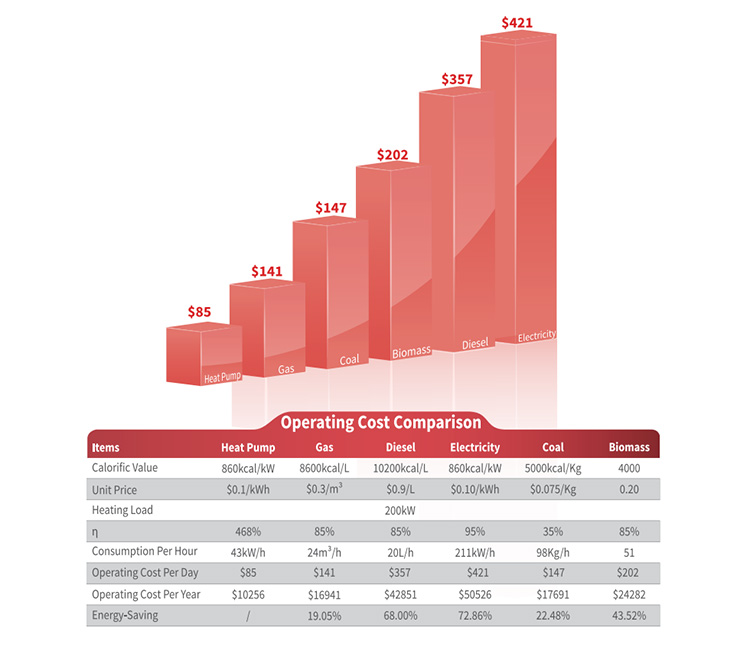-
What is air energy?
Air energy refers to the energy contained in the air, that is, the low-temperature heat in the air. The air we are talking about is the energy that the air absorbs from the sun. The higher the temperature, the more abundant the heat in the air.
Air energy water heaters, also known as "air source heat pump water heaters." The low-temperature heat in the air is absorbed, vaporized by a cold medium, then pressurized by a compressor, then heated by a heat exchanger, and heated by a heat exchanger to heat the water.
The air energy water heater is the fourth generation of water heaters, which combines the advantages of comfort, energy saving and safety. It has become the first choice for more and more people's domestic hot water.
Finney air energy water heater Yueshang type, exquisite and affordable, noble and elegant, stable water output
Heat pumps wroking Principle
By consuming very limited(25-30%)readily avaiable(electricty).Heat Pump transform lowest grade heat enery from soil ,groud ,air or other sources into higher grade heating energy for the ues in a wide range of applaictions.The heat pump principle works in both directions ,which means cooling and heating can be provide at the same time.Example:in winter the heat is absorded from the air water soil and in use in the house for heating and DHW supply.1kw electricity consumption by the heat pump may generate 3~5KW heating energy and 2~4KW cooling,1kw electricity consumption by the heat pump may generate 3~5KW heating engergy and 2~4KW cooling This is what we called Coefficient of Performance(cop).With COP up to 4.68 ,even higher.It saves energy as high as 78%.
Comparing the traditional heating/cooling methodes Heat Pump is extraordinga dvance in many aspect such as investment cost, operation expense
![SBU]W_62U$QM[UFKT4[(~WE.jpg SBU]W_62U$QM[UFKT4[(~WE.jpg](/upload/image/20181209/15443508201927900.jpg)
Energy resources Comparison
The date the following drawing are calculated on the basis of 20hrs/day in 120 days.

Air conditioning and air energy heat pump differenceWith the development of technology, air-energy heat pumps continue to appear in the public eye. Especially after the “coal to electricity” policy was vigorously promoted, air-energy heat pumps became more active in the market. Many people think that air can be air conditioning, air conditioning is an air energy heat pump, but the name is not the same. Is that really the case? Today, we will take a look at the working temperature, comfort and unit design requirements of air-conditioning and air-energy heat pumps.
1, working temperature
Many people ignore the operating temperature range of air conditioners is -7 ° C ~ 43 ° C. In other words, the air conditioner does not work properly in an environment below -7 °C. They often complain that air conditioners can't heat in winter, and they also charge a lot of electricity.
In fact, air conditioners have been difficult to heat at 0 °C. At this time, most air conditioners use electric-assisted heating. It is no wonder that air conditioners have a low heating capacity in winter and are very expensive.
The Folansi low temperature heating heat pump is specially designed for the climatic characteristics of cold regions, and has excellent low-temperature heating performance. According to the ambient temperature and water temperature, the unit automatically judges the load condition of the unit, and automatically adjusts the operating status during overload operation, so that the unit can work stably at -30 °C. The use of a jet-enhanced compressor significantly improves the heating effect. The unit can be matched with various ends such as fan coil, floor heating and radiator. It can replace traditional air conditioning + boiler heating system and is widely used in heating in cold families and commercial places.
2, comfort
Air conditioning and air energy work in the same way, but the heat exchange medium is different. The air conditioner acts as a medium throughout the air conditioner, and the air energy can also transfer heat through the refrigerant, but in the final heat exchange stage, the air energy is used for heat exchange.
That is to say, the air conditioner is a fluorine system cycle, and the air energy is a water system cycle. It is well known that the fluorine system absorbs a large amount of water from the air, whether it is cooling or heating, which causes the air to dry, making the throat hoarse and dry, especially in winter. The water system does not have such problems, so the overall humidity is more in line with the physiological habits of the human body, and does not cause "air conditioning disease" such as dry mouth and dry mouth.







